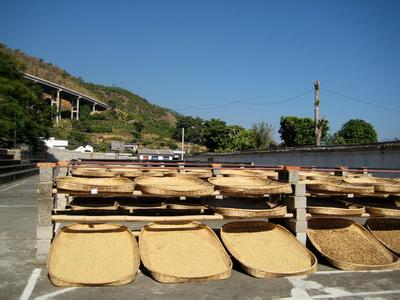A brief introduction to the treatment method of grinding degree and baking degree of Yunnan boutique coffee beans

Due to the lack of deep processing and marketing, Yunnan coffee is not well-known and unrecognized by people locked in the mountains. It is believed that with the in-depth development of Yunnan coffee industry, the rising demand of domestic coffee market and the efforts of the government and enterprises, Yunnan coffee will usher in a new period of development.
The western and southern parts of Yunnan Province are located between 15 °N and the Tropic of Cancer, and most areas are 1000-2000 meters above sea level. The topography is dominated by mountains and slopes, with large ups and downs, fertile soil, sufficient sunshine, rich rainfall and large temperature difference between day and night. These unique natural conditions form the particularity of Yunnan small grain coffee taste-strong but not bitter, fragrant but not strong, slightly fruity. As early as the 1950s, Yunnan small seed coffee was very popular in the international coffee market and was rated as the top grade of coffee.
The history of coffee cultivation in Yunnan can be traced back to 1892. A French missionary brought coffee to Yunnan from abroad and successfully planted it in a valley in Binchuan County, Yunnan Province. The coffee plants of this batch of coffee seeds are still blooming and bearing fruit in Binchuan County.
Yunnan coffee was planted on a large scale in the mid-1950s, with a planting scale of 4000 hectares at one time. By the end of 1997, the planting area of coffee in the province had reached 7800 hectares. At present, the planting area of the province accounts for 70% of the national area, and the output accounts for 83% of the whole country. Yunnan coffee has established the dominant position in China in terms of planting area and coffee bean production.
The suitable planting areas of coffee in Yunnan are distributed in Simao, Banna, Wenshan, Baoshan and Dehong in the south and southwest of Yunnan.
When ripe to pick some fruit to trace its roots, typica originated from Ethiopia, the ancient origin of coffee, is the earliest original species of coffee, bourbon is a variety of typica, both have a rich aroma and excellent taste performance, in the Arabica species also belong to a very high quality variety. It is said that the coffee tree species that was first introduced into Zhukula in Yunnan is typica. When coffee was planted on a large scale in Baoshan area in the 1950s, it was also typica and bourbon. But the problem is that although these two varieties have excellent taste, they are not resistant to diseases and insect pests, are prone to leaf rust, and the yield per mu is relatively low, so corresponding to this, there are "new varieties".
Small-grain coffee, also known as Arabica (Arabica), is the most traditional Arabica coffee variety, generally known as Yunnan small-grain coffee, has been cultivated for more than a hundred years. Before the 15th century, coffee was monopolized by the Arab world for a long time, so it was called Arabian coffee by Europeans. Originally, all the commercial coffee in the world were small-grain coffee, but it was not until a large-scale disease occurred at the end of the 19th century that growers began to look for other disease-resistant varieties. Small-grain coffee is still the main variety of coffee, accounting for about 3/4 of the world's total coffee production. Due to the unique geographical environment and climatic conditions, Yunnan small grain coffee has formed a unique flavor of strong but not bitter, fragrant but not strong, with a little fruit flavor. World-class coffee experts evaluate it as the best coffee in the world, and its cultivation techniques. The yield per unit area is also world-class.
Choose the coffee mother tree which is fully ripe, normal in shape, full in shape, the same size and with two seeds. To remove the peel of the selected fruit, you must be careful to prevent the seeds from being damaged and affect the germination rate, and then put the peeled seeds in a ventilated and cool place to dry. After the seed shell is whitened, the seeds can be stored, and the seeds can not be exposed to the sun. Put the seeds into bamboo baskets or cloth bags and turn them once a month in the mild sun, so that the seeds stored for a long time can maintain a high germination rate. Coffee seedlings need shade conditions, so the seedling land should be selected in shady slopes and sandy soil areas with certain shade conditions and water sources. The general method of seedling preparation is adopted to dig and loosen the soil into a seedbed and then sow seeds. According to sowing 1kg seeds, 1.5m2 seedbed is needed, and there are about 3500-4000 seeds per kilogram. If the emergence rate is more than 80%, 2500-3000 seedlings can be transferred. Before sowing, the seeds can be soaked in 40 ℃ warm water for 12 hours, and the effect is the best.
Coffee cultivation in China is concentrated in Yunnan and Hainan provinces. Yunnan has a large output, with an annual output of about 26000 tons in recent years, accounting for 90 per cent of the national output. It is said that Yunnan coffee came from the French 70 or 80 years ago. The main variety is Arabica Arabica, that is, the so-called small seed coffee, commonly known as Yunnan small grain coffee. Yunnan's high-quality geographical and climatic conditions provide good conditions for coffee growth. The planting areas are Lincang, Baoshan, Simao, Xishuangbanna, Dehong and other prefectures. The natural conditions of Yunnan are very similar to those of Colombia, that is, low latitude, high altitude and large temperature difference between day and night. The small grain coffee produced is mellow by cup quality analysis, and its quality and taste is similar to that of Colombian coffee.
However, due to a variety of reasons, the development of Yunnan coffee industry is not fast. Yunnan coffee is mainly exported as raw materials, with an export volume of about 15000 tons in 2006. More than 60% of raw materials are acquired by Nestl é and Maxwell each year, and Starbucks and Amway have joined in recent years.
Important Notice :
前街咖啡 FrontStreet Coffee has moved to new addredd:
FrontStreet Coffee Address: 315,Donghua East Road,GuangZhou
Tel:020 38364473
- Prev

A brief introduction to the cultivation of high-yield high-quality coffee beans in Yunnan, geographical location, climate and altitude
However, it does not mean that you have not had a cup of good Yunnan coffee, and if the post-processing and baking is good, as a friend said here, the coffee from several hills, such as Pu'er Manlaojiang, Kaddura of Manzhong Tian, Tielka of Baihualing of Lujiang, Baoshan, and Bourbon of Lujiang, Baoshan, is still good, especially resistant. The old varieties of Yunnan coffee at 1800m above sea level are currently supplied to the domestic market by 30%, 70%.
- Next

Medium-sized Vietnamese coffee beans Flavor Taste Aroma Description Introduction
Vietnam's geographical location is very conducive to coffee cultivation, the south of Vietnam has a hot and humid tropical climate, suitable for growing ROBUSTA coffee, and the north is suitable for growing ARABICA coffee. Coffee production in Vietnam has the following characteristics: (1) Since there is no effective method to deal with defoliation, in the early 1980s, medium-grain coffee was selected as the main variety. (2)Based on planting techniques
Related
- Detailed explanation of Jadeite planting Land in Panamanian Jadeite Manor introduction to the grading system of Jadeite competitive bidding, Red bid, Green bid and Rose Summer
- Story of Coffee planting in Brenka region of Costa Rica Stonehenge Manor anaerobic heavy honey treatment of flavor mouth
- What's on the barrel of Blue Mountain Coffee beans?
- Can American coffee also pull flowers? How to use hot American style to pull out a good-looking pattern?
- Can you make a cold extract with coffee beans? What is the right proportion for cold-extracted coffee formula?
- Indonesian PWN Gold Mandrine Coffee Origin Features Flavor How to Chong? Mandolin coffee is American.
- A brief introduction to the flavor characteristics of Brazilian yellow bourbon coffee beans
- What is the effect of different water quality on the flavor of cold-extracted coffee? What kind of water is best for brewing coffee?
- Why do you think of Rose Summer whenever you mention Panamanian coffee?
- Introduction to the characteristics of authentic blue mountain coffee bean producing areas? What is the CIB Coffee Authority in Jamaica?

